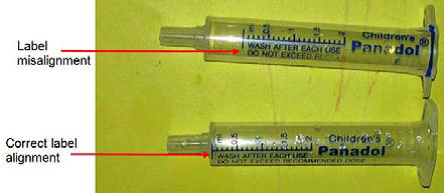News
Kid's Panadol safety advisory
 The Therapeutic Goods Administration has warned consumers that some measuring syringes supplied with Children’s Panadol Baby Drops have the "potential to lead to accidental overdoses".
The Therapeutic Goods Administration has warned consumers that some measuring syringes supplied with Children’s Panadol Baby Drops have the "potential to lead to accidental overdoses".
Apparently some of the syringes have been incorrectly marked, with consumers urged to check any of the devices at home. "If the dosing indicator does not begin from the bottom of the syringe near the tip, do not use the syringe to measure out the medicine," the TGA said. The issue only applies to the dosing syringes supplied with Children’s Panadol Bay Drops, and does not affect the quality of the accompanying medicine.
GlaxoSmithKline has initiated a voluntary recall of the dosing device, and says that after initial investigations "this appears to be a rare incident and a low safety risk". Consumers who are uncertain if their syringe is affected are being told to consult their pharmacist.
"If the syringe is incorrect it should be returned to the pharmacy, or the consumer can call the GSK Product Information line on 1800 650 123," the firm said. GlaxoSmithKline is conducting a thorough investigation of the issue "and appropriate actions are being taken to ensure that this situation does not occur again".
The company said the only component impacted is the syringe and "therefore consumers may choose to dispose of the incorrect syrringe and continue using the product with another suitable syringe".
GSK medical director, Dr Andrew Yeates, said that if a child has been dosed using an incorrect syringe following the label instructions there is a low risk to their health. However if parents or carers have concerns about a potential overdose they should ring the Poisons Information Centre on 131 126 or "go to the hospital immediately even if your child feels well because of the risk of delayed, serious liver damage if left untreated."
"Pharmacists and doctors have been advised of the situation and have been asked to apply clinical judgement should a patient experience a worsening of their symptoms," Yeates said.
Source: pharmacydaily.com, Monday 25 November 2013
